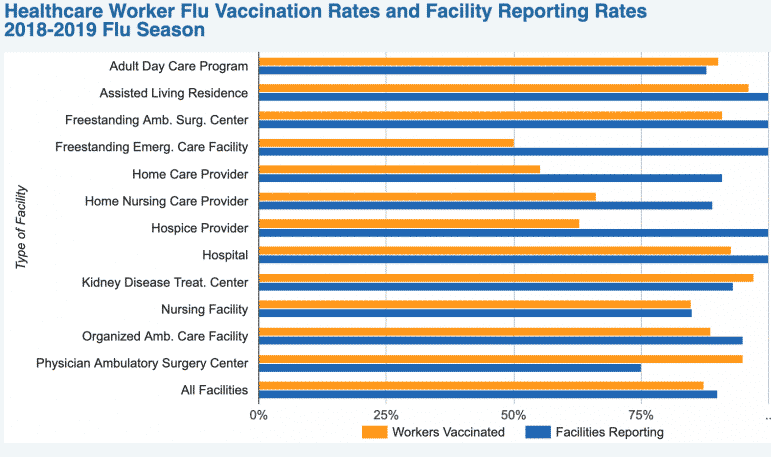![[CREDIT: RIDOH] The state reports flu widespread in RI, meaning unvaccinated health care workers must wear masks during work.](https://e8dgfhu6pow.exactdn.com/wp-content/uploads/2019/12/RIDOHFlu-Widespread-2019-1.png?strip=all&lossy=1&ssl=1)
![[CREDIT: RIDOH] Flu is reported widespread in RI, meaning unvaccinated health care workers must wear masks during work.](https://e8dgfhu6pow.exactdn.com/wp-content/uploads/2019/12/RIDOHFlu-Widespread-2019-1.png?strip=all&lossy=1&ssl=1)
According to the Centers for Disease Control and Prevention, widespread flu is a geographic measure, counting outbreaks of influenza or increases in influenza-like-illness (ILI) cases and recent laboratory-confirmed influenza in at least half the regions of the state with recent laboratory evidence of influenza in the state. It does not measure the severity of flu activity.
Use of masks in these conditions is meant to prevent unvaccinated workers from being infected and to prevent unvaccinated health workers from spreading flu to vulnerable people.
“The masking requirement is critical in protecting healthcare workers from catching the flu, and also in protecting patients who are often dealing with other serious health issues,” said Director of Health Nicole Alexander-Scott, MD, MPH. “For people who have not been vaccinated yet, it is not too late. Flu vaccine is the best way to keep yourself and the people you love safe from the flu.”

Last year, RIDOH reports, 87.4 percent of workers at all healthcare facilities reported getting vaccinated. The least fully vaccinated staff were at free-standing emergency facilities, where only half the staff were reported to have been vaccinated.
So far during the 2019-2020 influenza season, there have been 52 hospitalizations and 2 influenz
a-associated deaths, according to the RIDOH. Nationwide, the CDC estimates there have been at least 3.7 million flu illnesses, 32,000 hospitalizations and 1,800 deaths from flu.
Influenza B is the predominant circulating virus in Rhode Island, RIDOH reports. That’s also the case nation-wide, according to the CDC, which reported the B/Colorado/06/2017-like (Victoria lineage) virus as the active virus in 97 percent of flu cases recorded Sept. 29, 2019.
This year, the CDC reports, only quadrivalent (protecting against four strains of flu) vaccine was distributed. The four strains it protects against are:
- A/Brisbane/02/2018 (H1N1)pdm09-like virus (updated)
- A/Kansas/14/2017 (H3N2)-like virus (updated)
- B/Colorado/06/2017-like (Victoria lineage) virus
- B/Phuket/3073/2013-like (Yamagata lineage) virus.
Unvaccinated healthcare workers in these facilities must wear surgical masks when involved in direct patient contact. Direct patient contact is considered routinely anticipated face-to-face contact with patients, such as entering a patient’s room, serving food to patients, or participating in group patient activities.
In addition to the healthcare workers in these facilities, all licensed EMS practitioners who have not been vaccinated against the flu must wear masks when engaged in direct patient contact.
The healthcare facilities and organizations to which this regulation applies are:
- Adult day care programs
- Assisted living facilities
- CVS Minute Clinics
- Free-standing ambulatory care surgical centers
- Free-standing emergency care facilities
- Home care providers
- Home nursing care providers
- Hospice providers
- Hospitals
- Kidney treatment centers
- Nursing facilities
- Organized ambulatory care facilities
- Physician ambulatory surgery centers
Everyone older than 6 months of age should be vaccinated against the flu every year. In addition to healthcare workers, vaccination is particularly important for pregnant women, people over the age of 50, nursing or group home residents, and people with chronic conditions (such as heart, lung, or kidney disease, diabetes, asthma, anemia, blood disorders, or weakened immune systems).
Symptoms of the flu can include fever, cough, head and body aches, fatigue, and runny nose. Some people also have vomiting and diarrhea.
Flu shots are available at doctors’ offices and pharmacies throughout Rhode Island. You can check on where vaccine is available at https://vaccinefinder.org/.
This is a test
